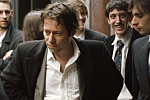 Shadows off the beaten path
Shadows off the beaten path< < F O R E I G N > >
last update 11.May.08
See also: SHADOWS FILM FESTIVAL
 R E V I E W B Y R I C H C L I N E
R E V I E W B Y R I C H C L I N E
scr Cathy Rabin
with Linus Roache, Rahul Bose, Jennifer Ehle, Nandita Das, John Standing, Indrajith Sukumaran, Lal Paul, Leopold Benedict, Thilakan, Ejji K Umamahesh
 release US 9.May.08,
release US 9.May.08, UK 25.Jul.08
07/India 1h38
TORONTO FILM FEST

 Sumptuous camera work and strongly internalised acting make this morality play worth seeing as an intriguing examination of a serious culture clash. But it's all slightly underdeveloped.
Sumptuous camera work and strongly internalised acting make this morality play worth seeing as an intriguing examination of a serious culture clash. But it's all slightly underdeveloped.
In 1937 India, English engineer Henry (Roache) has a plan to transport spices to Europe and make his fortune. He cools his affair with the family housekeeper Sajani (Das) when his wife and son (Ehle and Benedict) return from England. But Sajani's husband (Paul) hears a rumour, and the ensuing scandal threatens everyone's lives, as well as Henry's funding from a prominent banker (Standing). So Henry gets his faithful right-hand man TK (Bose) to help solve the problem. But things only go from bad to worse.
Sivan sharply captures the textures, dense colours and raw beauty of the setting. We feel the sun's heat and the coolness of the shady forest, with its gurgling streams and waterfalls. And the faces of the characters are just as expressive, adding an earthy honesty to the momentous events. In the middle of this is a forbidden affair, as Henry and Sajani have gone too far to just walk away, even though the local laws could mean death for everyone involved.
Although this is a forceful story, the filmmakers refuse to limit themselves to a specific point of view. We're bounced between three different perspectives: Henry's arrogant confidence, Sajani's careless romance and TK's reluctant loyalty. Throw in some sideplots, including a workers' strike and a growing independence movement (neither of which are developed), plus a general theme about sexism in both the local and expat societies, and the film is going in too many directions to properly engage us with the central melodrama.
That said, this wide-angled approach does paint a vivid picture of a nation beginning to break free of colonialism. And the cast is excellent, especially Roache, Ehle and Bose in the more complex roles as people genuinely struggling with their moral response to a tricky situation. As it progresses, the story is powerful enough to grab our interest, if not our emotion. We have no idea where it's heading next, and the final act is extremely intense and provocative, especially as it also works as an allegory for the relationship between Britain and India.
23.Apr.08
 R E V I E W B Y R I C H C L I N E
R E V I E W B Y R I C H C L I N E
with Greg Timmermans, Laura Verlinden, Marijke Pinoy, Pol Goossen, Titus De Voogdt, Maarten Claeyssens, Gilles De Schrijver, Tania Van der Sanden, Ron Cornet, Peter De Graef, Johan Heldenbergh, Jakob Beks

release Bel 26.Sep.07,
UK 29.Aug.08
07/Belgium 1h33
BERLIN FILM FEST
 There's an especially important central theme to this striking teen drama that gives the film a potent urgency. Although as a foreign art film, it'll perhaps never reach the people who need to see it most.
There's an especially important central theme to this striking teen drama that gives the film a potent urgency. Although as a foreign art film, it'll perhaps never reach the people who need to see it most.
Ben (Timmermans) is an autistic teen who functions well enough to attend school and get high grades. But his classmates don't understand why he seems so detached, so they tease him mercilessly. Two students (De Voogdt and Claeyssens) take it further, indulging in cruel and often horrific bullying. To cope, Ben retreats into a virtual videogame world where he's a hero with a loyal sidekick (Verlinden) who understands him. But Ben's teachers seem especially useless. And his divorced parents (Pinoy and Goossen) are at wit's end how to help.
Writer-director Balthazar tackles bullying head-on, letting us see the events from Ben's specific perspective. The tight subjectivity gives the film an emotional kick, as every scene is shot and edited to put us right into Ben's head, including the videogame elements that invade his real life. And this gives us a fiercely challenging angle on the story, which is loosely based on real events.
Along the way, Balthazar builds an intense sense of dread through both the gaming motif ("Someone always has to die," Ben observes) and through to-camera interviews that seem to be part of a documentary about whatever it is that's going to happen. It's shot in a style that's moody and darkly textured, sharply capturing both the harsh school environment and Ben's internal fantasy world. The result is utterly gripping, even as there are times when we don't really want to see what will happen next.
And where it's going is continually surprising. Especially when the actors all deliver raw performances that are full of honest touches--humour, hope and anguish. As Ben begins to consider suicide as his only option, the film takes on a hugely emotive tone that's both thought-provoking and strongly moving. Would it really require a teen's death for people to take notice of an awful situation and do something about it? This may seem a bit extreme for a film plot, but our newspapers suggest that it's scarily close to the truth.
8.May.08
 R E V I E W B Y R I C H C L I N E
R E V I E W B Y R I C H C L I N E La Question Humaine
La Question Humaine
scr Elisabeth Perceval
with Mathieu Amalric, Michael Lonsdale, Edith Scob, Jean-Pierre Kalfon, Valérie Dréville, Laetitia Spigarelli, Delphine Chuillot, Lou Castel, Rémy Carpentier, Nicolas Maury, Erwan Ribard, Patrick Zocco
 release Fr 12.Sep.07,
release Fr 12.Sep.07, US 14.Mar.08,
UK 16.May.08
07/France 2h15
CANNES FILM FEST
 Intriguing and provocative, this artful corporate thriller holds our interest through its intense themes and strong performances. Even though it's somewhat slow and plodding.
Intriguing and provocative, this artful corporate thriller holds our interest through its intense themes and strong performances. Even though it's somewhat slow and plodding.
Simon (Amalric) is a corporate psychologist asked by an executive (Kalfon) to investigate the odd behaviour of CEO Jüst (Lonsdale). But the more he digs, the murkier the story gets, from the CEO's secretary (Dréville) to his other partners in an office musical quartet (Castel and Carpentier). The current situation has something to do with the company's collaboration with the Nazis during the war. But Simon is struggling to concentrate on his investigation after a drug-fuelled weekend of clubbing while juggling two women (Spigarelli and Chuillot).
Director Klotz creates a tone that's almost elegiac, with a glassy, icy visual sheen punctuated by the sudden chaos of a fistfight, a rave or a particularly passionate snog. The camerawork is static and almost disinterested, with scenes set up like tableaus. Despite constant references to events in the past, there are no flashbacks; the film is about the power of words and memories to affect the present. And in this sense, the film's closing moments are seriously haunting.
The cast deliver sharp performances that are subdued almost to the point of being subliminal. Amalric plays Simon's internal turmoil with a provocative tranquillity--we know his life is fragmenting into chaos, and yet he pretends he's in control. Meanwhile, Lonsdale does exactly the opposite, playing Jüst as if he's slipping into madness while surprising us with glimpses of his underlying lucidity.
Yes, this is complex stuff, and it's probably too arty to connect with most audiences. But there's a powerful sense of duality: human vs corporate, work vs play, madness vs sanity, political correctness vs ruthless business practice. Each character is in hiding at various levels, and as the grisly truth of the Holocaust seeps into their present-day lives, they're forced to respond to what they have witnessed or have learned (the English title refers to a particularly gruesome Nazi invention). And the larger question is seriously provocative: are we human beings or mere "pieces" in the plans of a tyrant? Or a faceless corporation?
5.May.08
 R E V I E W B Y R I C H C L I N E
R E V I E W B Y R I C H C L I N E
scr Haruka Handa, Sori
voices Meisa Kuroki , Shosuke Tanihara, Yasuko Matsuyuki, Tetsuya Kakihara, Akio Otsuka, Toshiyuki Morikawa, Romi Pak, Takahiro Sakurai
 release Jap 18.Aug.07,
release Jap 18.Aug.07, US 14.Feb.08,
UK 9.May.08
07/Japan 1h49
TORONTO FILM FEST

 A flood of visual inventiveness keeps us watching this futuristic animated action thriller. There are also some intriguing political ideas at work, even if it feels a bit derivative and thin.
A flood of visual inventiveness keeps us watching this futuristic animated action thriller. There are also some intriguing political ideas at work, even if it feels a bit derivative and thin.
In the year 2067, Japan isolated itself from the world over bio-ethics, continuing to develop human-robotic hybrids against UN regulations. A decade later, the Americans believe Japan is a threat, so they send in a special forces unit led by Vexille (voiced by Kuroki). The mission quickly goes awry, but Vexille is rescued by a local woman, Maria (Matsuyuki), who has a connection with Vexille's missing colleague-boyfriend Leon (Tanihara). So she teams with the locals to take down the mega-corporation that now controls the country.
The gorgeous animation is loaded with realistic details and set on a grand scale with seriously impressive action sequences and extremely cool character design. And it's accompanied by a superbly pulsating score by Paul Oakenfold. The result is punchy and vivid, with constant surprises and a colourful, emotional tone. On the other hand, it's strangely joyless, constantly explaining every plot point, security system and historical reference far beyond what's strictly necessary.
In other words, there's a dangerous whiff of pretentiousness that's eerily reminiscent of The Matrix, the Star Wars prequels and even Dune. Many of the big action set pieces are far too overcomplicated, bordering on nonsensical, with "rules" that seem to come from a videogame rather than any sense of storytelling. This is especially notable in the major action sequence in which our band of heroes try to drag cables through tunnels in which doors are closing one by one. It looks fantastic, but has absolutely no logic to it.
Even so, this will definitely appeal to its target audience of fanboys who love eye-popping animation that features massive action and hot fighter chicks. On the subject of research and technology, the film has a strangely hysterical tone that seems terrified of progress. But there are some clever observations about the global-political situation, even if the final message is a little simplistic: beware rogue states and communicate hope, not hate! In the end it's worth seeing for the dazzling imagery, but it's a pity the plot doesn't show nearly as much creativity.
25.Mar.08


See also: SHADOWS FILM FESTIVAL
© 2008 by Rich Cline, Shadows
on the Wall